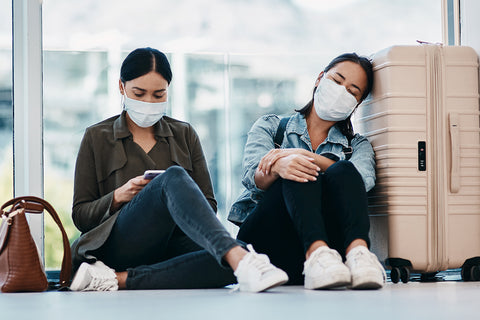Know Why Jet Lag Happens & Beat It With 6 Airtight Tactics

Know Why Jet Lag Happens & Beat It With 6 Airtight Tactics
With the resumption of air travel in 2022, we have gone back to our all-time favourite “hobby” - travelling. We set out to our beloved travel destinations like Japan, South Korea and Thailand, some even went as far as to the U.S. and Europe. However, one problem arises especially for travellers setting out to the other side of the world: jet lag.
Jet lag is a common problem that plagues many travellers, with symptoms like fatigue, headaches, difficulty sleeping, and general malaise. We definitely don’t want any of these.
In this article, we seek to discover easy yet powerful tactics to beat jet lag. But before we know how to beat jet lag, what is it really and what causes it.
What is jet lag and how does it happen?
First and foremost to understand our own body - our body has its clock, known as the circadian rhythm, that helps regulate your sleep and wake cycles. Your brain uses light and darkness to keep this rhythm on track, that’s where curtains, sunlight (and the absence of it) come in.
However, when you travel across different time zones, your internal clock gets thrown off balance. This is because your brain needs time to adjust to the new patterns of light and darkness in the new time zone, and it can take a while to get back on track.
Imagine your usual routine back home in Singapore, you wake up at 7 am, get dressed, have breakfast, set off and start work at 9 am. Your body has become used to this routine and will be reminded to wake up around 7am everyday.
Now, let's say you go on a holiday to New York, which is in an entirely different time zone. When you arrive in New York, it's 7 pm there, but it's still 7 am in Singapore. Your body is confused because it thinks it's morning (as your usual Singapore routine) when it's nighttime (where you are really at right now in NY).
The result? The highly-undesirable jet lag.
Travel fatigue, post-holiday exhaustion, etc. - are they all the same?
Jet lag, travel fatigue, post-holiday exhaustion… These are words thrown around often when we talk about our travels and holidays. Are they related terms? Yes, but not the same thing.
Travel fatigue and post-holiday exhaustion are similar to jet lag in that they can leave you feeling tired and run down. Travel fatigue can happen after a long journey, even if you don't cross any time zones. Post-holiday exhaustion can occur when you return from a trip, and your body needs time to readjust to your normal routine. Travel fatigue and post-holiday exhaustion can occur from a variety of factors such as physical exertion, stress, and lack of sleep.
While these conditions may share some symptoms with jet lag, the causes and treatments may be different. Specifically, jet lag is caused by travelling across time zones.
The 6 tactics to alleviate your jet lags and travel fatigue

Jet lag can throw off your sleep schedule, make you groggy, and even affect your mood. If you're a frequent traveller, you know how disruptive jet lag and travel fatigue can be. If you have not experienced it before, we hope you won’t ever.
Nevertheless, there are several tactics you can use to alleviate the symptoms and beat jet lag and travel fatigue. Simple, yet effective tactics that you can employ throughout your travels.
Boost your energy with energy shots

Energy shots can provide a quick burst of energy when you're feeling tired or rundown from jet lag. However, energy shots or drinks typically contain high levels of sugar, which can result in a subsequent sugar crash. This can cause headaches and worsen symptoms of jet lag. What you want for an effective energy boost is a healthy, low-sugar option (even better: zero sugar!), such as those offered by 5-hour ENERGY®. Their products contain a special blend of essential B-vitamins, amino acids and nutrients for energy and alertness. It has zero herbal stimulants, zero sugar, and only 4-calories! Not just to beat jet lag, 5-hour ENERGY® can also be incredibly useful as an extra boost of energy during your travels. Who will mind the extra oomph to hike the snowy tracks of Mt. Fuji, or for another go at the exhilarating rides of Disneyland?
Get active with exercises
Exercise is a great way to boost your energy, improve your mood, and alleviate stress. Even a short walk or jog can help you feel more awake and alert, alleviating the jet lag symptoms. Try to fit in some physical activity each day, especially when you first land, whether it's a workout at the hotel gym or a brisk walk around town. Take the chance to explore more of your destination on foot!
Strategize your exposure to light
Exposure to light is a key factor in regulating your sleep and wake cycles. Try to get as much natural light as possible during the day, and avoid bright lights at night. Yes, you might have guessed, bright lights at night include your beloved devices. Put them away! If you're travelling to a new time zone, you can gradually adjust your sleep schedule by exposing yourself to light at the appropriate times. As a guide, if you're flying eastward, expose yourself to light in the morning, and if you're flying westward, expose yourself to light in the evening.
Pace your meals
You would have felt sluggish or experienced a “food coma” even back in Singapore after a heavy meal more so when you travel across to a new time zone. It's because your body has to work harder to digest large amounts of food, leaving you feeling tired. Worse still, it could disrupt sleep, worsen jet lag symptoms and lead to indigestion. Instead of heavy meals, try to pace your meals throughout the day with small, frequent meals that are high in protein and fibre. Avoid sugary or fatty foods that can cause crashes later on, and try to eat at least a few hours before going to bed.
Stay hydrated with lots of water

Dehydration is one of the most common causes of fatigue and low energy levels. It's essential to drink plenty of water throughout the day, especially when travelling by air, where the air is dry and can lead to dehydration. Keep a water bottle with you at all times and take regular sips to stay hydrated. Avoid alcohol which can dehydrate you and disrupt your sleep; we know it’s tough especially during holidays, but avoid as best you can especially during the first or second day of landing. If you're not a fan of plain water, try adding some fruit slices or herbal tea bags to your water bottle for a refreshing twist.
Time your sleep schedule
Jet lag can wreak havoc on your sleep schedule and leave you feeling exhausted and disoriented. The best way to combat jet lag is to adjust your sleep schedule to the new time zone gradually. If you're travelling eastward, try going to bed an hour earlier each night leading up to your trip. If you're travelling westward, stay up an hour later each night. Once you arrive at your destination, try to stick to a regular sleep schedule to help your body adjust.
Enjoy your holiday how it should be - no jet lag or travel exhaustion
With these six tactics on how to beat jet lag, you can alleviate the symptoms quicker and enjoy your holiday to the fullest. Whether you're travelling for business or pleasure, these tips can help you stay energised and alert, and make the most of your time away. They could work well not just for travels across vastly different time zones, but for any travel at all in general. So pack your luggage, and get ready to beat jet lag and travel fatigue with these airtight tactics!



